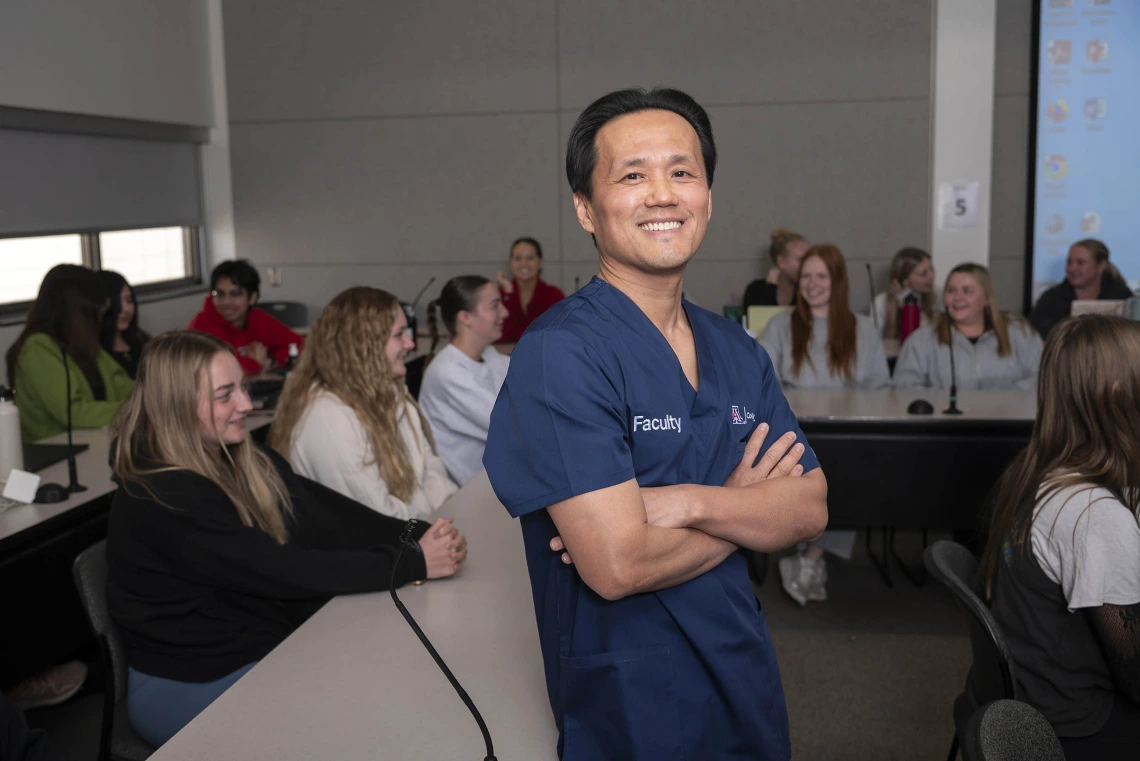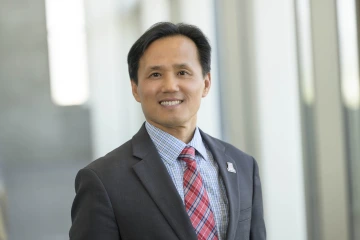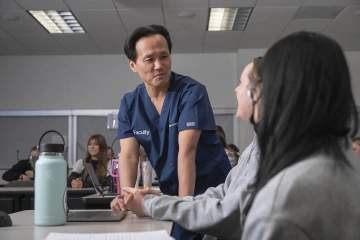Connecting with Dean Hyochol Brian Ahn
New Nursing dean says technology, including AI, will enhance research and education to reach even more of those in need of care.

Hyochol Brian Ahn, PhD, was named dean of the University of Arizona College of Nursing in May 2023.
Since taking over the leadership of the University of Arizona College of Nursing in May, Dean Hyochol Brian Ahn, PhD, has been working to grow the technological aspects of nursing research and education.

Hyochol Brian Ahn, PhD
That’s not surprising considering he holds six degrees across engineering and nursing — a bachelor’s in electrical engineering from the University of Seoul in South Korea and, from the University of Florida, a master’s in electrical and computer engineering; a bachelor’s, master’s and doctorate in nursing; and a master’s in medical sciences. He has also earned three graduate certificates (aging and geriatric practice, adult nurse practitioner and nursing education).
Health Sciences Connect recently caught up with Ahn to learn more about his vision for the future of the college, how engineering and nursing work together and problem-solving the nursing shortage in Arizona.
What about you makes you uniquely positioned to lead the College of Nursing now?
Beyond my academic and research achievements, my identity as a first-generation Asian-American male nurse adds a valuable perspective to my leadership. I have actively contributed to diversity, equity and inclusion efforts. I am dedicated to understanding cross-ethnic variations in the social, cultural, and behavioral factors related to trauma, stress and resilience among minority populations. As we face nursing shortages around the country, highlighting how the profession is for all, as well as my leadership in eliminating health disparities while advancing research will show people who might not have considered the profession that they have a future in nursing.
You have been with the University of Arizona College of Nursing for a little over six months now. What has been the biggest surprise to you in that time?
I have been moved by the dedication and ceaseless work exhibited by our faculty, staff, community and hospital collaborators, and our diligent students. It has illuminated for me the reasons why the UArizona College of Nursing stands as a distinguished national institution celebrated for its outstanding nursing programs and pioneering research initiatives.
What do you see ahead for the college in the next six months?
I see us – faculty, staff and students – all growing our commitment to high-quality education, innovative research and patient care, as well as fostering strong community partnerships. Over the next five years, the class size is projected to grow by approximately 400 students, culminating in an overall increase of 1,000 students per year, which will help ease the national nursing shortage. Additionally, we are in the process of establishing a new BSN-Integrative Health program in Tucson, specifically designed to cater to the needs of rural underserved populations. The college will emphasize cutting-edge education, equipping students with the fundamental nursing skills and the ability to adapt to technological advancements and interdisciplinary collaboration. Moreover, the college will work on establishing the Center for Health and Technology to facilitate nursing-engineering technology approaches on the development, evaluation and implementation of technology-enhanced interventions to improve the reach of evidence-based interventions.
How will your computer and electrical engineering background advance the college?
Computer and electrical engineering can significantly advance the college in several ways.

Hyochol Brian Ahn, PhD, speaks with nursing students.
First, computer and electrical engineering can facilitate the seamless integration of advanced health care technologies, including incorporating telehealth systems, electronic health records and medical devices to enhance patient care, data analysis and clinical training.
The synergy between nursing and engineering can strengthen health informatics, improving the management and analysis of health care data, leading to more informed decision-making, better patient outcomes and enhanced research capabilities within the college.
Further, engineers can collaborate with nursing professionals to design and develop innovative medical devices and wearable technologies tailored to specific health care needs. High-fidelity simulators and virtual reality environments can provide nursing students with realistic training experiences, improving their clinical skills and readiness.
Collaborations between nursing researchers and engineers can lead to breakthroughs in health care technology and medical research. This interdisciplinary approach can address complex health care challenges, such as disease detection, monitoring and treatment.
We’ve seen the statistics that there aren’t enough nurses to meet the needs of Arizonans. What efforts are you and the college undertaking to improve that situation?
We are undertaking several efforts to improve the nurse-to-population ratio in the state. These include increasing the number of nursing students admitted. Our college annually admits around 600 pre-licensure nursing students via Bachelor of Science in Nursing, BSN-IH and Master's Entry to the Profession of Nursing programs, in addition to approximately 150 advanced-nursing-practice students.
We will expand our existing programs and establish collaborations with health care institutions to create ample clinical placement opportunities for a more substantial student cohort. We are actively promoting diversity and fostering inclusion within nursing education, which is vital to addressing workforce shortages while ensuring culturally competent care.
We also intend to invest in faculty development programs to ensure we have an ample pool of qualified educators to whom we are providing ongoing training and incentive advanced degrees and certifications. Finally, we are promoting collaborative partnerships with health care institutions in our region to furnish additional clinical placement opportunities for our students.
Where do you see the Gilbert nursing program in five years?
This past year marked a period of significant growth for our Gilbert nursing programs, notably through the admission of MEPN students every semester, a change from our previous annual intake. This has expanded our capacity from 281 to 360 students annually, significantly broadening the reach and impact of our prelicensure nursing program. Looking forward, over the next five years, both the BSN-IH and the MEPN programs are poised to implement revised competency-based curricula. These updates, which align with the latest standards from the American Association of Colleges of Nursing, will ensure that our programs remain at the forefront of nursing education.
The centerpiece of our Gilbert facility is our state-of-the-art simulation center, providing students with exceptional, hands-on experiences that mirror real-world health care scenarios. This focus on evidence-based experiential learning is crucial for equipping students with the skills, competencies and confidence needed to thrive in the rewarding and dynamic field of nursing.
What would you tell a student interested in the profession today? How would you prepare them for the next 40 years of nursing?
I think it's crucial to recognize that nursing is a profession of unwavering relevance and growth. Our college will equip them with a robust foundation in health care knowledge, ethical practice and critical thinking, which are essential for the ever-evolving landscape of health care over the next 40 years. They should embrace the opportunities to specialize, adapt to emerging technologies and engage in lifelong learning.
Nursing will continuously challenge you, but it also offers immense fulfillment and the privilege of making a difference in people's lives. By cultivating a strong academic foundation and a deep commitment to compassionate care, the College of Nursing will prepare you not just for the next 40 years, but for a lifelong, rewarding career in nursing.

